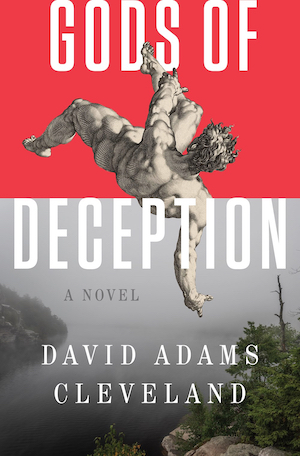Out today we have a new novel that will delight fans of historical crime fiction and the espionage genre. Gods of Deception is a 928-page epic written by David Adams Cleveland, and it delves deep into what was one of the biggest trials of the 20th century in the United States. In 1950, Alger Hiss was accused of spying for the Soviet Union, and at the time nobody really knew whether he was guilty or innocent. This is what Edward Dimock, the judge in the trial, is pondering in his old age, so in this fictional retelling he asks his grandson George Altmann to help him.
The author has played on this trial and its effects on later generations, crafting a nuanced story that also involves the themes of art, ideology, family, double lives and even parallel universes.
Once a journalist and the arts editor of Voice of America, David Adams Cleveland is well qualified to write about these sweeping topics. He covered the Glasnost era in Eastern Europe and his father worked for the State Department. Meanwhile, his son is the founder of Artsy.net and David was involved in setting it up. Plus, he’s always been fascinated by Hiss and the ‘trial of the century’. We decided to find out more about how he created this fascinating book…
First off – what are crime fiction lovers going to love about Gods of Deception?
I hope readers are going to respond to a literary novel that goes way beyond just the espionage/crime elements – as exciting, puzzling-strange, and tragic as those might be – to the deeper human dimensions of the story: the impact of ideological struggles on one American family and how the truth can change the way we understand the past, and so ourselves. The most profound truths are not just issues of guilt or innocence, but motivations and how we justify lies large and small, even with the best of intentions. And how the cost of those lies echoes down the wind both for one family and a nation.
Tell us a little more about George Altmann and how you crafted him as a character?
The thing that fascinated me most about the Hiss trial was the competing narratives put forth by Alger Hiss and his accuser Whitaker Chambers, with Hiss and his defenders dismissing as pathological fantasy Chamber’s testimony (and later his autobiography, Witness) about his years as Hiss’s spy master and close friend – a friendship which included their wives. One of them was lying. But for the country, for Hiss defenders and detractors, these competing narratives were like the existence of parallel universes, one in which Hiss was an extraordinary and upstanding public servant, the other in which he was a fanatical liar and agent of influence for Stalin. Two distinct worlds, two perceptions of reality jostling one another in spacetime: and a hard truth hanging in the balance. Who better to disentangle this mind-boggling conundrum than Princeton astrophysicist, George Altmann, who is able to straddle these parallel universes and so discover their intersection points – that fine line between truth and fiction, causation and correlation?
The accused spy Alger Hiss and Judge Dimock were real historical figures. What drew you to them and this case?
Alger Hiss was easy. All the most notorious spies of the 20th century – one thinks of the Cambridge spies: Kim Philby, Guy Burgess, and Donald Maclean – defected to the Soviet Union and admitted their spying, where they died of alcoholism in their Moscow dachas. All were consumed by fear of exposure as traitors to their class and country. Not Alger Hiss, who maintained his innocence – and almost superhuman equanimity – against all the evidence to his dying day. What kind of man, now that we know he was guilty as hell, what kind of actor can maintain that role – the Iago of his times – so effortlessly? I set out to explore that question through the eyes of the Judge, who knew Hiss and his wife Priscilla. Judge Edward Dimock is indeed a historical figure who I remember from my childhood in the Catskills where he had a home. Dimock had a kind of omniscient aura about him that always intrigued me, even as the character who entered the pages of Gods of Deception is just that, a fictional character.

How did you research them and the story in general?
There was a lot written about the Hiss case in the decades after the 1950 trial, more than anyone could read, much less want to process – a maze of conspiracy theories about how Hiss was framed by Chambers and the FBI – making the sifting of facts and fantasy difficult. The game changer was the release of Venona in the mid-90s, decrypted Soviet cable traffic from WWII, and data from Soviet intelligence files garnered by researchers during Boris Yeltsin’s Presidency of Russia.
The cumulative evidence proved beyond a doubt that Alger Hiss had been a spy – and worse, an agent of influence sitting at Roosevelt’s right hand at Yalta, where he was debriefed by his Soviet handler each morning vis-a-vis the American and allied negotiating position. The giveaway of Eastern Europe and other Yalta concessions to Stalin have the fingerprints of Hiss and his fellow spies, Harry Dexter White at the Treasury and Lauchlin Currie in the White House, all over them. We now know from Venona that on the way back from Yalta, Alger Hiss and members of the American delegation stopped briefly in Moscow, where Hiss was taken aside in a secret ceremony and presented with the Order of the Red Star by the head of Soviet intelligence. In writing the novel and wading through all the recent historical data it became clear that Hiss was only the tip of the iceberg: a secret underground network of over 500 Soviet agents had penetrated the US government and related war industries!
Tell us more about your love of art and the role art plays in the story?
I like to think of my work as an art historian and novelist as complementary. In art history I relish telling stories about the art and artist, while writing novels I like to describe settings with the eye of a painter.
In Gods of Deception, two of my protagonists are involved in the art world: George Altmann has left his physicist PhD unfinished to try his hand as a gallerist, and his lover and fellow searcher, Wendy Bradley, is an artist when she isn’t rock climbing. Their impassioned relationship energises the novel, along with their quest for the truth about Alger Hiss, which in turn reveals the truth about George’s painter grandfather, who covered the trial as a courtroom artist, only to die in uncertain circumstances in a fall from Woodstock’s Fishkill Bridge. Artworks throughout the novel – pencil sketches of KGB victims, a painted 16th Century ceiling of the gods cavorting in the cosmos, and the abstract nudes of Wendy Bradley – all serve, as does the most profound art, as mirrors to the characters’ deepest desires and preoccupations, pointing to a supersensible world of the spirit. Yet another parallel universe!
What is it about the corrosive power of secrets that attracts writers such as yourself, or le Carré, and other masters of espionage?
A life of secrets by its very nature requires masterful lying and double identities – and the body counts left behind by a life of subterfuge. Disguises, masks, disinformation, false flags are always fascinating subjects for the writer, as are the split personalities of protean characters like Hamlet and Iago. But beyond the lure and fascination of a secret life (how did they pull it off?) is the even more intriguing issue of motivation. What was it, what siren song so impelled a spy like Alger Hiss to betray their country and people he broke bread with every day? Whittaker Chambers, Hiss’s spy handler, addresses this question in his masterful autobiography, Witness, where he describes Stalin’s spell this way: “For the temper of Stalin’s mind requires a strategy of multiple deceptions, which confuse the victim with the illusion of power, and soften them up with the illusion of hope, only to plunge them deeper into despair when the illusion fades, the trap is sprung, and the victims gasp with horror, as they hurtle into space.”
And so my title. The spell of Stalin’s and Lenin’s Soviet Union led so many well-meaning if gullible individuals astray – an enduring mystery that resonates larger than ever today with Putin’s invasion of Ukraine and campaign of disinformation.
How do you feel the 1950s Cold War element of your story will resonate today?
It is creepy strange and tragic how ex-KGB agent Vladimir Putin has been able to resurrect so much of Stalin’s totalitarian state. How, even in this age of ubiquitous access to information, Putin has managed to so propagandise a portion of the Russian people that they willingly support an unjustified and brutal war against Ukraine, although young and savvy and educated Russians seem to be leaving in droves. The story of Gods of Deception, when the KGB and their spies penetrated to the heart of the Roosevelt administration, once seemed like a bad dream of a time gone by. The Russian spies may be gone, but the KGB’s techniques of disinformation and the big lie are deployed again in full force – yet another parallel universe! – along with the brutal application of force to deter any opposition. Sadly, tragically, Gods of Deception reads, more than ever, like a cautionary tale.
Which crime fiction and espionage authors have influenced you most?
John le Carré, without doubt, for his masterful probing of motivation and his sophisticated deeply wrought characters. Also, Joseph Conrad’s novels, The Secret Agent and Under Western Eyes, which were so prescient in their depiction of the ideological battles that would so devastate the 20th century. Along with Heart of Darkness that offered readers a disturbing look at the horrors to come.
What’s next for David Adams Cleveland?
I’m near to finishing novel five, working title, Reunions, about four women returning for a college reunion where they run into a graduating senior, the son of a classmate, who knows more about their student days and love affairs than any son should know. Abbeville Press wants me to do a shorter version of my History of American Tonalism, a coffee table book with lots of reproductions.
The Gods of Deception is out now – order a copy using the buttons below. You can visit the author’s website here.







